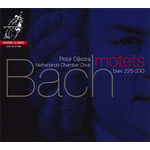
Motets BWV225-230
 $43.00
Out of Stock
$43.00
Out of Stock6+ weeks add to cart
J.S. BACH
Motets BWV225-230
Netherlands Chamber Choir / Peter Dijkstra
[ Channel Classics SACD / Hybrid SACD ]
Release Date: Saturday 31 May 2008
This item is currently out of stock. It may take 6 or more weeks to obtain from when you place your order as this is a specialist product.
"Finally, here is a recording of Bach's motets (sung at sensible tempos) that employs a moderately-sized choir...Channel Classics' sound is typically demonstration-quality...Essential!"
(ClassicsToday 10/10)
"Finally, here is a recording of Bach's motets (sung at sensible tempos) that employs a moderately-sized choir (two dozen voices--no "one-to-a-part" stuff here!), a simple basso continuo (organ and cello), and doesn't get hung up on the "did he or didn't he" nonsense regarding BWV 230 (Lobet den Herrn), rightly including it among the "standard six" works Bach composed in this rather vaguely defined genre. Other recordings offer very satisfying results--René Jacobs and the RIAS-Kammerchor, who present the "standard six" with small orchestra and continuo of strings and winds (Harmonia Mundi), and Harry Christophers and the Sixteen, who do the basic six with continuo of cello, violone, theorbo, and organ--but this one captures the essence of these extraordinary works as vocal music, stripping the scores down to texts and singers, with instruments enlisted as unobtrusive partners in filling out texture and adding depth and body to the bass line.
Conductor Peter Dijkstra is not as concerned with particular means of articulation as he is with the importance of "the vocal line", which he regards as paramount--but of course, his care for the one results in exceptionally clear, clean expression of the other, transmitted with his choir's impressively vibrant energy and authoritative style. These motets never have sounded so fresh, alive, and exciting as on this Channel Classics recording, nor has a choir so proficiently and artfully demonstrated the ingenious and powerful musical dialogues in the double-choir works or more handily elucidated the profoundly difficult and complex movements of Jesu, meine Freude. This latter certainly is the highlight of the disc, each verse a virtuosic display of technique as well as a moving expression of the text. My only reservations concern a momentarily odd tempo shift in the middle of Lobet den Herrn (no big deal, but strange nevertheless) and the failure to simply list the continuo players in an obvious place with the other performers. Channel Classics' sound is typically demonstration-quality, and the packaging is very sensible and user-friendly. Essential!"
(ClassicsToday 10/10)
Our most familiar image of Bach is that of the cantor of the Thomaskirche in Leipzig. For 27 years, Bach was in charge of church music for Sundays and festival music for the four principal churches of Leipzig: the Thomaskirche, the Nicolaikirche, the Peterskirche, and the Neue Kirche. It was here that he composed many of his cantatas, his passions, which have since become famous throughout the musical world, and also his Six Motets. These Motets are occasional compositions, composed for one-time events; four of them were for funerals. Only one of the motets can definitely be linked to a particular occasion: "Der Geist hilft unser Schwachheit auf", which was composed for the funeral of Johann Heinrich Ernesti, the rector of the Leipzig Thomasschule, on 24 October 1729. The motet "Lobet den Herrn, alle Heiden" is stylistically and formally rather different from the five others, and as a result Bach's authorship of the composition is still in doubt.
Tracks:
1 Singet dem Herrn ein neues Lied BWV 225
2 Der Geist hilft unser Schwachheit auf BWV 226
3 Jesu, meine Freude BWV 227)
4 Fürchte dich nicht BWV 228
5 Komm, Jesu, komm BWV 229
6 Lobet den Herrn, alle Heiden BWV 230



